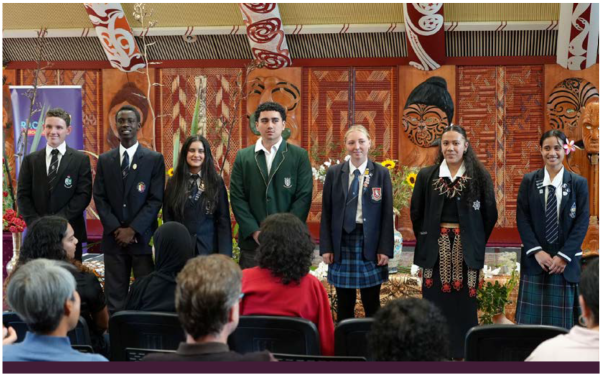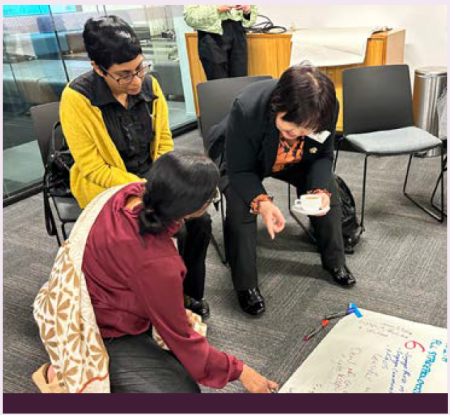Supporting ethnic representation on public sector boards and committees
We manage a nominations database of 272 individuals who identify with ethnic heritage and are interested in serving on public sector boards/committees.
This year, we continued to promote and upskill people on our nominations database.
From January to June 2024, we started emailing the database contacts fortnightly to inform them about public sector board/committee vacancies.
Feedback received about the fortnightly emails has been positive. The feedback also confirmed that this approach increased awareness about the range of available public sector board/committee vacancies. It has prompted individuals to self-nominate for roles that are of interest rather than relying on the Ministry’s nominations.
To help people on the database build their governance knowledge and capability, we collaborated with other nominating agencies to deliver six online learning sessions: the Ministry for Women, Whaikaha – the Ministry of Disabled People, Te Puni Kōkiri – the Ministry of Māori Development and the Ministry for Pacific Peoples.
These learning sessions were delivered with the support of a range of guest speakers who shared their knowledge and advice.

Recordings of the online training sessions are made available at Leadership Learning Hub Ministry for Women.
The learning sessions covered:
- LinkedIn presence
- Learning about the Crown boards that the Ministry of Business, Innovation and Employment administers
- Learning about the portfolio of the Ministry of Health administered boards/committees
- Introduction to governance – how to write a governance curriculum vitae (CV) and craft a compelling cover letter.
In August 2023, we supported another initiative aiming to increase ethnic representation on boards. We sponsored the Women in Governance Summit and our Chief Executive participated in the main panel session.
The summit aimed to support those new to governance or with experience in board directorship looking to increase their skills and knowledge. It also aimed to support executives seeking career transition to governance and boards wanting to diversify their board membership.
Celebrating youth voices
Over 100 youth participated in the Race Unity Aotearoa Speech Awards, including finalists who gave speeches at the May 2024 finals. We are proud to have sponsored these awards since 2009. This programme, a nearly two-decade-long tradition, has become a nationwide cornerstone event for schools and students.
The seven finalists, a diverse group representing high schools across New Zealand, shared their visions for a racist-free Aotearoa. Year 13 Otago Girls’ High School student Tanya Moeono was honoured with the Tohu Whetumatarau – Ministry for Ethnic Communities Award for Vision for her inspiring vision of a multicultural society founded on Te Tiriti o Waitangi.
The Award’s Founding Partners include the New Zealand Baha’i Community and the New Zealand Police. These Awards highlight the initiatives we support for youth development, race unity and a socially cohesive and inclusive Aotearoa New Zealand.

Photo of the Race Unity Awards seven finalists.
Case study one - Inaugural Ethnic Research Hui Aotearoa 2023
Our objective
To explore how to better integrate ethnic voices and evidence into public policy, enhancing the visibility and impact of New Zealand’s diverse communities.
What we did
The Ministry, in collaboration with Ethnic Research Aotearoa, hosted the Ethnic Research Hui Aotearoa 2023 at the National Library. The hui drew over 100 participants, including researchers, policy analysts and community leaders.
Key components included a panel discussion with distinguished experts, presentations on research and evaluation, and interactive discussions. The discussions covered the following topics:
- Nothing about us without us
- Networks and active collaboration
- Results dissemination and evidence use by practitioners and policy-makers
- Existing research and evaluation funds and models.
What was the result
The event successfully facilitated meaningful dialogue, the sharing of insights and the formation of networks among participants.
The hui also highlighted the importance of capturing ethnic voices and building an evidence base to inform effective policies.
The discussions provided knowledge and offered valuable insights on available funding opportunities and research models tailored to the needs of Ethnic Communities.

Photo from one of the stream’s working groups.
What this means for all New Zealanders, including our Ethnic Communities
The hui represented a significant step towards long-term change rather than a one-time event. It aimed at bridging the gap between Ethnic Communities and public policy, fostering a sense of belonging and empowerment.
The initiative supports the development of more equitable and effective public services for all New Zealanders by emphasising the inclusion of ethnic perspectives in policy-making.
Previous: Priority 1. Promoting the value of diversity and improving inclusion of Ethnic Communities
